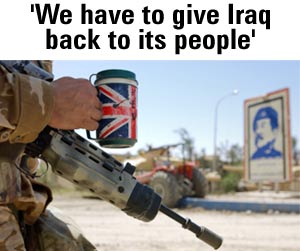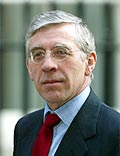
| 
| 
|
Home > News > Interview
The Rediff Interview/Jack Straw
April 04, 2003

British Foreign Secretary Jack Straw has the onerous task of justifying Prime Minister Tony Blair's decision to support the US war against Iraq despite immense public opposition. In an interview with World Vision's Saeed Naqvi, Straw not only defends the decision, but says the allies are prepared for a long-drawn out war. He also touches on the joint statement issued by him and US Secretary of State Colin Powell urging Pakistan to check cross border terrorism in Kashmir. US Secretary of State Colin Powell told us that General Tommy Franks will be the interim administrator in post war Iraq. Will you go along with that?  In the first early period, after there has been military success in Iraq, it is bound to be the fact that our military coalition forces will be the people over there to provide law and order, and as it were to fill in the vacuum left by the absence of Saddam Hussein's government. In the first early period, after there has been military success in Iraq, it is bound to be the fact that our military coalition forces will be the people over there to provide law and order, and as it were to fill in the vacuum left by the absence of Saddam Hussein's government.
But we and the Americans want to move very swiftly from what amounts to a military situation to a situation in which there is a civilian government which is owned and run by the Iraqi people. The purpose of this military campaign is to rid Iraq of its WMD [Weapons of Mass Destruction]. We have to do that now by removing the Iraqi regime and to give Iraq back to its people. You clearly proffered a more international approach but do you seriously think the French, Germans, Russians will be on board on reconstruction so early? There is no direct time frame. We've said, President Bush has said, Prime Minister Blair has said that the military action will take as long as it takes, and one of the facts of military action is that you can't make absolutely firm predictions about how long any military action is going to take. We are there to see this through and then we'd be there in support of the Iraqi people and any new representative Iraqi government, as long as it is necessary to get the Iraqi government back on its feet. But I am optimistic for Iraq and its government because this is a hugely potential prosperous country with very large oil resources which have been squandered over the last 25 years, and they are to be used for the Iraqi people. Of course, it's true there were very clear divisions in the Security Council, on whether military action should be taken which led to a failure to achieve the second resolution. But I take heart from the fact that in the last two weeks the international community has come together more. We've now got a good oil for food resolution from the Security Council... and 1472 last week, and I'm looking forward to the discussion with Joschka Fischer, the German foreign minister, the Russian foreign minister Dominique De Villepin about how we've worked together to achieve international consensus. In a Baghdad market place an Iraqi man stands with pieces of his child's body and as an American jet flies overhead he screams 'coward, coward.' How do you respond to that? How do you think the British public will respond to that? I think the public has the same view as I do, which is of horror at any civilian death in any way. I mourn for the deaths of these people, these babies and children and the fact that they are Iraqis is irrelevant. They are people, they are human beings. None of us wanted to get engaged in military action. We've worked very hard to avoid civilian deaths and casualties. There will be some, very sadly, but I believe that once this military action is over the total number of civilian deaths and casualties would have been shown to be relatively small. I'm also certain that the result of this military action will be to have spared the hundreds and thousands of Iraqis who would have otherwise faced death at the hands of Saddam Hussein and his people. Foreign Secretary, at the Camp David summit between Prime Minister Blair and President Bush, in the midst of your preoccupation with the Iraq war, you took time out to issue this joint declaration, an important joint declaration in which you asked Pakistan to take certain steps to stop cross border terrorism. What next? Secretary Powell and I issued this statement from Camp David because of our very grave concern about increasing evidence of infiltration across the Line of Control from Pakistan to India, and, of course, about the recent terrible atrocities which led to the death of many innocent women, children and men in Jammu and Kashmir. We are calling on the Pakistani government to do everything they can to stop infiltration. We want to see them encouraging an end to all kinds of militant and terrorist operations in Jammu and Kashmir, whether they are operated from the Indian or Pakistani side of the border. Along with that we want to see the beginning of a political process so that we get into a stage where both sides of the LoC, J&K on the Indian side and Azad Kashmir on the Pakistani side, the people of both sides can live in peace and harmony. You have spoken to the Chinese, haven't you? What response did you get on this -- putting their pressure on Pakistan to stop this kind of terrorism? China is a very important world power. It is also directly neighbours with Pakistan and has had a long history of close and personal friendship with Pakistan and good friendship with India. So I was pleased when I spoke to the Chinese foreign minister the other day and he accepts that there's great potential across the LoC for a further escalation of violence and the PRC (People's Republic of China) would do anything to reduce this tension across the LoC. The British have fought many wars against Iraq, you know the country extremely well. Probably the Americans don't. Don't you think that you miscalculated the level of resistance? They (the coalition forces) have not underestimated the level of resistance that we thought we would encounter at all. We had very good estimation about the armed security forces available to Saddam. This is a big country, twice the size of France with about 20 million people. Of these around 2 million people are involved one way or the other in security forces, and some of them are very well equipped. So we anticipated there would be serious and significant resistance, especially by those people who've been part of the reign of terror operated by Saddam, and it's exactly how it's turning out to be. The monster of Baghdad is the Hero of Arab world says one of your newspapers. Clearly this is an unintended outcome. Isn't it? Neither do I believe this is going to happen, of course a tyrant like Saddam Hussein cornered is going to try and manoeuvre himself from the position of tyrant to the position of hero, and he will get up to any trick he can. We are concerned that in Najaf and Karbala, the holy shrines of Shias, Saddam would damage them as he did in 1991 and blame the coalition. That is why we are going to extreme lengths to ensure the security, integrity and sanctity of those holy shrines, even if they are firing at coalition forces from these holy shrines. If that happens we will try and not return fire so as to preserve the sanctity of these shrines. There are lots of people who believe that in the post war reconstruction of Iraq, British and American firms will get the advantage in all the contracts? What's your reaction? I can't speculate on that. What we want to see is a UN endorsement of a post-conflict arrangement and above all President Bush, Secretary Powell and Prime Minister Blair have said we want to see and ensure that the oil revenues, the riches of Iraq are once again used for the benefit of the people of Iraq and for them alone. To echo the words of Powell at a newspaper interview last weekend: 'We see a central role for the UN in post conflict Iraq.' The UN is always involved in post-conflict situations like Bosnia, Kosovo, Afghanistan, Cambodia and East Timor and many other situations. So they have a role. What we have to do is enter into detailed discussions with the United States and our partners in the Security Council to create a framework and machinery which fits the circumstances of Iraq. Photographs: Getty Images; Design: Dominic Xavier The Gulf War II
The Rediff Interviews
| 
| 
 | Article Tools |  | |



|